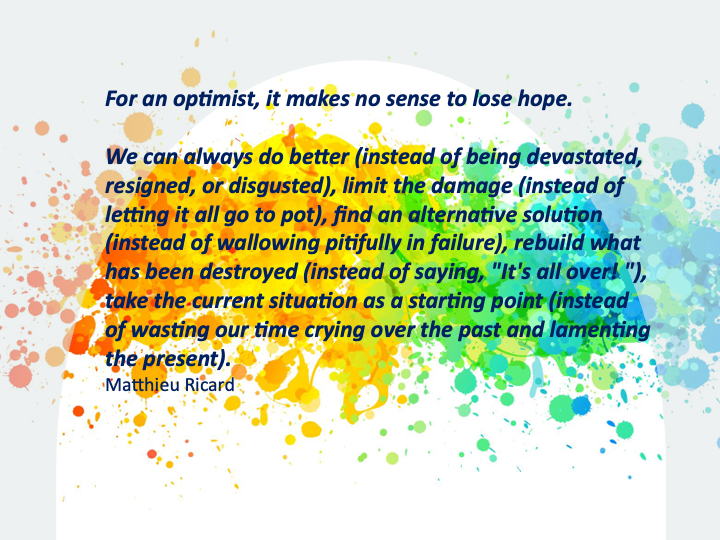Tag Archive for 'speranza'
At the end of Italian football championships, Rudi Garcia, Roma coach, continues to have the hope that, also if Juventus has 8 points more than his team, something could happen changing this ranking in favor of Roma. At this regard, which are the psychological basis of the hope thinking?
“Snyder, Irving & Anderson (1991, as cited in Snyder, 2000, p.8) define hope as “a positive motivational state that is based on an interactively derived sense of successful (a) agency (goal-directed energy) and (b) pathways (planning to meet goals)” .
Hope theory can be subdivided into four categories: goals, pathway thoughts, agency thoughts and barriers. Goals that are valuable and uncertain are described by Snyder (1994, as cited in Snyder, 2000, p.9) as the anchors of hope theory as they provide direction and an endpoint for hopeful thinking. Pathway thoughts refer to the routes we take to achieve our desired goals and the individual’s perceived ability to produce these routes (Snyder, 2000). Agency thoughts refer to the motivation we have to undertake the routes towards our goals. Barriers block the attainment of our goals and in the event of a barrier we can either give up or we can use our pathway thoughts to create new routes.” (From http://www.positivepsychology.org.uk/pp-theory/hope/100-what-is-hope-and-how-can-we-measure-it.html)
This definition fits well with Roma, because the team build is confidence through the winning results and its cohesion, directing in this direction its energy and during all the season showed the road it took to reach these results greatly.
“For generations of Americans, it was a given that children would live longer than their parents. But there is now mounting evidence that this enduring trend has reversed itself for the country’s least-educated whites, an increasingly troubled group whose life expectancy has fallen by four years since 1990.
Researchers have long documented that the most educated Americans were making the biggest gains in life expectancy, but now they say mortality data show that life spans for some of the least educated Americans are actually contracting. Four studies in recent years identified modest declines, but a new one that looks separately at Americans lacking a high school diploma found disturbingly sharp drops in life expectancy for whites in this group. Experts not involved in the new research said its findings were persuasive.
The reasons for the decline remain unclear, but researchers offered possible explanations, including a spike in prescription drug overdoses among young whites, higher rates of smoking among less educated white women, rising obesity, and a steady increase in the number of the least educated Americans who lack health insurance.
The steepest declines were for white women without a high school diploma, who lost five years of life between 1990 and 2008, said S. Jay Olshansky, a public health professor at the University of Illinois at Chicago and the lead investigator on the study, published last month in Health Affairs. By 2008, life expectancy for black women without a high school diploma had surpassed that of white women of the same education level, the study found.
White men lacking a high school diploma lost three years of life. Life expectancy for both blacks and Hispanics of the same education level rose, the data showed. But blacks over all do not live as long as whites, while Hispanics live longer than both whites and blacks.
… The five-year decline for white women rivals the catastrophic seven-year drop for Russian men in the years after the collapse of the Soviet Union, said Michael Marmot, director of the Institute of Health Equity in London.
The decline among the least educated non-Hispanic whites, who make up a shrinking share of the population, widened an already troubling gap. The latest estimate shows life expectancy for white women without a high school diploma was 73.5 years, compared with 83.9 years for white women with a college degree or more. For white men, the gap was even bigger: 67.5 years for the least educated white men compared with 80.4 for those with a college degree or better”.
Article written by Sabrina Tavernise, in:
Federico Rampini nel suo ultimo libro intitolato “Alla mia sinistra” in cui parla di globalizzazione e mercato, introduce un concetto psicologico denominato “la redistribuzione della speranza” e che riprende da un articolo pubblicato da The Economist. Si dice che negli ultimi 400 anni il mondo occidentale ha goduto di un vantaggio comparativo sul resto del mondo che ha permesso una visione ottimistica dello sviluppo della società e del progresso ma ora la fiducia nel futuro si è spostata su altri paesi. Infatti, oggi mostra questo atteggiamento solo più il 30% degli americani e meno ancora gli europei; di contro l’’87% dei cinesi, il 50% dei brasiliani e il 45% degli indiani sono convinti che il loro paese stia andando nelle giusta direzione. The Economist esorta “Va a Est, giovane uomo”. L’UNESCO ha rilevato che in cinque anni, dal 2002 al 2007, le ricerche scientifiche effettuate nei paesi che stanno avendo la crescita maggiore sono passate dal 30% al 38%. Che possono fare individualmente i giovani italiani? Andare a vedere il resto del mondo – suggerisce Rampini – quello che non è Occidente. Fare esperienze di vita e di studio anche temporanee, respirare un’altra aria piena di fiducia e di energia. Provare a vivere do ve è ora la speranza, per imparare.
I ragazzi e le ragazze italiane abbandonano lo sport a 14 e 11 anni. Siamo uno dei paesi del mondo occidentale con meno laureati ed è appena stata pubblicata una ricerca da cui emerge che solo il 21% dei nostri giovani è convinto che lavorerà nell’azienda in cui vorrebbe impiegarsi contro il 35% degli inglesi, il 37% degli svedesi e il 38% dei francesi. Bene! Continuiamo così a negare la realizzazione dei sogni e a allontanarli dallo sport e dallo studio.
Era ora che qualcuno osasse parlare di speranza, giacchè siamo in Italia. Lo ha fatto Emanuela Audisio su Repubblica di oggi, un articolo da conservare perchè non è rivolto al presente ma parla del futuro e cioè dei nuovi talenti dello sport italiano. Dalle dichiarazioni di questi ragazzi appare evidente che non sono degli sfaticati, come spesso si sente dire dagli allenatori, al contrario hanno idee chiare e precise e conoscono molto bene cosa vuole dire sacrificarsi per un obiettivo. Diciamolo: sono giovani che coltivano il loro sogno e non credo che nella vita di una persona vi sia qualcosa di più coinvolgente del poterlo fare. Giovani così praticano golf, tennis, ginnastica artistica, scherma, nuoto, tiro a volo, salto in alto e calcio. Sono ragazze e ragazzi tra 14 e 20 anni. Dalle frasi dei ragazzi riportate nell’articolo si evidenzia ciò che le ricerche sullo sviluppo dei talenti hanno evidenziato. Il primo aspetto è il ruolo decisivo dei genitori nel sostenere i loro figli in termini di stabilità psicologica (e ovviamente economico) e nel farli continuare negli studi. Il secondo aspetto è avere allenatori di alto livello “nonostante” la loro giovane età. Il terzo aspetto è l’elevato grado di consapevolezza che questi giovani hanno già sviluppato in relazione alla loro vita quotidiana extrasportiva e agli obiettivi sportivi che si pongono. Quarto, sanno che lottano per il vertice sportivo assoluto e ne sono contenti.






